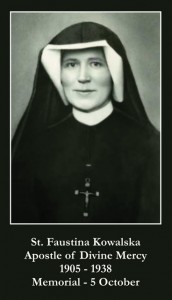3/4 In answer to the Servant of God Luisa Piccarreta’s request for Mercy,
St. Mary Faustina of the Blessed Sacrament was born the following year on August 2, 1905
Poland, the birthplace of the Divine Mercy message, and also of Saint John Paul II (Mary’s “Masterpiece” in a message of the Blessed Mother’s to Fr. Gobbie), points to a more positive sign of the times—the gradual reconciliation of the Eastern and Western Churches. The period between Luisa’s death and the opening of her cause for beatification coincided with a grace-filled movement toward reconciliation between the Church of Rome and the ancient Churches of the East, especially the Orthodox Church. Luisa’s Cause was opened during the Pontificate and approval of Saint John Paul II.
As a meeting place for the Latin Rite Catholics of the West, and the Orthodox and Byzantine Catholics of the East, Poland gave to the world the devotion to the Divine Mercy that combined the Trisagion prayer of the Byzantine liturgy “Holy God, Holy Mighty One, Holy Immortal One, Have mercy on us and on the whole world” (Divine Liturgy of St. John Chrysostrom), with the use of the Rosary. Luisa is also connected to this same prayer, which the Priest would say while at the same time making the sign of the Cross on her hand to command her soul to return to her body. This connection between Luisa and Poland, the home of Saint John Paul II, is made even more clear by the date of Luisa’s death on March 4, 1947—the Feast Day of St. Casimir of Poland.
St. Casimir of Poland—Feast Day March 4th. He was third of the 13 children of King Casimir IV of Poland and Elizabeth of Austria, daughter of Emperor II of Germany. He was born at the royal palace in Cracow on October 3rd. Many miracles were reported at his tomb, and he was canonized by Pope Adrian VI in 1522. He is the Patron of Poland and Lithuania.
As Cardinal Archbishop of Cracow, Wojtyla ordered a theological review of St. Faustina’s diaries, which had been condemned by the Holy See. As a result of the inquiry, the prohibition against the spread of her writings was removed. Six months later, Wojtyla was elected to the Chair of Peter. As Saint John Paul II, he published one of his first encyclicals on the Mercy of God, and acknowledged the importance of Blessed Faustina and her writings by beatifying her on the Feast of Divine Mercy. The beatification of Saint Faustina attracted new interest in the prophetic content of her diaries, which predicted the Second Coming of Jesus.

